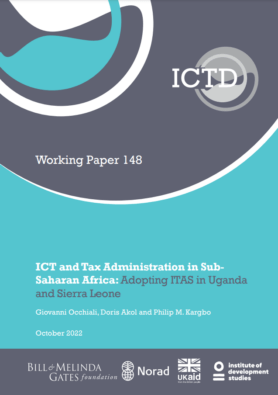Working Paper 148
The adoption of information and communication technologies (ICTs) in the public sector, including for tax administration, has been hailed as potentially transformational over the last few decades. Its impact has been less far-reaching than imagined. A literature examining the determinants of – and obstacles to – ICT adoption arose as a result, almost exclusively focusing on the experience of high-income countries. However, understanding the experience of adoption in low-income countries is equally important, especially given the potential role that ICTs can play in tackling various development issues, including increasing mobilisation of domestic revenue. To help fill this gap, we present two in-depth case studies of the process of adopting an integrated tax administration system (ITAS) in Uganda and Sierra Leone, based on a series of semi-structured interviews with members of the respective revenue authorities and ministries of finance. Our analysis shows that many of the factors that facilitate and impede the adoption process are the same as those identified in high-income countries. However, we also identify some factors that are more likely to be relevant for low-income countries. These include the impact of the timeline for disbursing donor funding, the processes donors require to be used for procurement, and the quality of legacy data to be migrated into the new system. The need to embark on change management and re-engineering business processes was also recognised more fully than might have been expected in countries with relatively little prior experience in e-government services.
